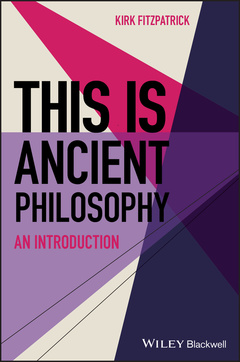Description
This is Ancient Philosophy
An Introduction
This is Philosophy Series
Author: Fitzpatrick Kirk
Director of collection: Hales Steven D.
Language: English
· Paperback
Description
/li>Contents
/li>Biography
/li>
?A masterful introduction to ancient philosophy. Fitzpatrick knows the contemporary scholarship on these authors, so he can shift from summarizing their thought to scrutinizing individual arguments. Meanwhile the writing remains so accessible that a reader might not notice how much he covers. The prose is precise but relaxed, with details that enrich the texture: the Pythagoreans? harmonies, the Stoic Horned Argument, Antisthenes? daily walk to Socrates. Students and instructors alike will benefit.?
?Nickolas Pappas, Professor at City College of New York (CUNY)
This Is Ancient Philosophy is a fascinating introduction to the major philosophers and foundational concepts of classical antiquity.
Assuming no prior knowledge, the book uses an intuitive, readable narrative style as it examines the ideas, influences, and interconnections of philosophers such as Socrates, the Sophists, Plato, and Aristotle, as well as philosophical schools of thought including Cynicism, Epicureanism, Stoicism, and Skepticism.
Divided into three parts, the book opens with an overview of early Greek philosophy, describing the turn from mythological thinking to philosophical analysis. The second part focuses on the distinctions between the subjects of philosophy in both the Golden Age and today, followed by a survey of the Hellenistic period and a discussion of the relation between fate and freedom of action. Throughout, readers are aided by a wealth of instructive and engaging charts, grids, figures, and a detailed map illustrating the chronological development of philosophy, from Asia Minor to southern Italy and Athens.
Part of the popular This Is Philosophy series, This Is Ancient Philosophy is an excellent text for students of philosophy, both introductory and advanced, and general readers with interest in the philosophy of the classical era.
Acknowledgements i
Map ii
Introduction iv
Part One: Early Greek Philosophy 1
Chapter One: Miletus and Elea 2
1.1 Miletus
1.1.1 Thales
1.1.2 Anaximander
1.1.3 Anaximenes
1.1.4 Xenophanes
1.2 Elea
1.2.1 Parmenides
1.2.2 Zeno
1.2.3 Empedocles
Chapter Two: Ionia and Thrace 18
2.1 Ionia
2.1.1 Pythagoras
2.1.2 Anaxagoras
2.1.3 Heraclitus
2.2 Thrace
2.2.1 Leucippus and Democritus
Chapter Three: The Philosophic Turn 33
Part Two: The Golden Age
Chapter Four: Plato 44
4.1 Biography and Texts
4.2 The Socratic Dialogues
4.3 The Sophists
4.4 Plato’s Philosophy
4.4.1 Knowledge
4.4.2 The Forms
4.4.4 The Cave, Line, and Sun
4.4.5 The Soul
4.4.6 The State
Chapter Five: Aristotle 81
5.1 Biography and Texts
5.2 Aristotle’s Philosophy
5.2.1 The Subjects
5.2.2 Doxography
5.2.3 The Four Causes
5.2.4 Hylomorphism
5.2.5 Voluntary Action
5.2.6 Knowing and Doing
5.2.7 Virtue
5.2.8 Politics
Chapter Six: The Subjects of Philosophy 103
Part Three: Hellenistic Philosophy
Chapter Seven: Cynicism and Epicureanism 109
7.1 Alexander’s Death
7.2 Cynicism
7.2.1 Antisthenes
7.2.2 Diogenes of Sinope
7.3 Epicurus and Epicureanism
7.3.1 Physics, Canon, and Ethics
7.3.1.1 Physics
7.3.1.2 Canon
7.3.1.3 Ethics
7.3.2 Lucretius as Epicurean
7.3.2.1 Physics
7.3.2.2 Canon
7.3.2.3 Ethics
Chapter Eight: Stoicism and Skepticism 127
8.1 Stoicism
8.1.1 The Stoics
8.1.2 Stoic Philosophy
8.1.2.1 Physics
8.1.2.2 Logic
8.1.2.3 Ethics
8.1.2.3.1 Desire
8.1.2.3.2 Duty
8.1.2.3.3 Assent
8.2 Skepticism: Pyrrhonians and Academics
8.2.1 History
8.2.2 Pyrrhonism
8.2.3 The Academics
8.2.3.1 Arcesilaus
8.2.3.2 Carneades
Chapter Nine: Fate and the Good Life 151
9.1 Historical Context
9.2 Moral Weakness as Akrasia
9.3 Fate and Voluntary Action
9.4 The Good Life
Index 172
KIRK FITZPATRICK is Professor of Philosophy at Southern Utah University, where he teaches philosophy and Attic Greek. From 2012 to 2016, he served as Director of the Grace A. Tanner Center at Southern Utah University. His publications focus on leadership, poetry, and music in Plato’s Republic, as well as the philosophy of education, politics, and moral weakness. Fitzpatrick’s recent publications include “Two Songs in the Kallipolis of Plato’s Republic,” in The Political Science Reviewer, vol. 45, no. 1 (2021).




